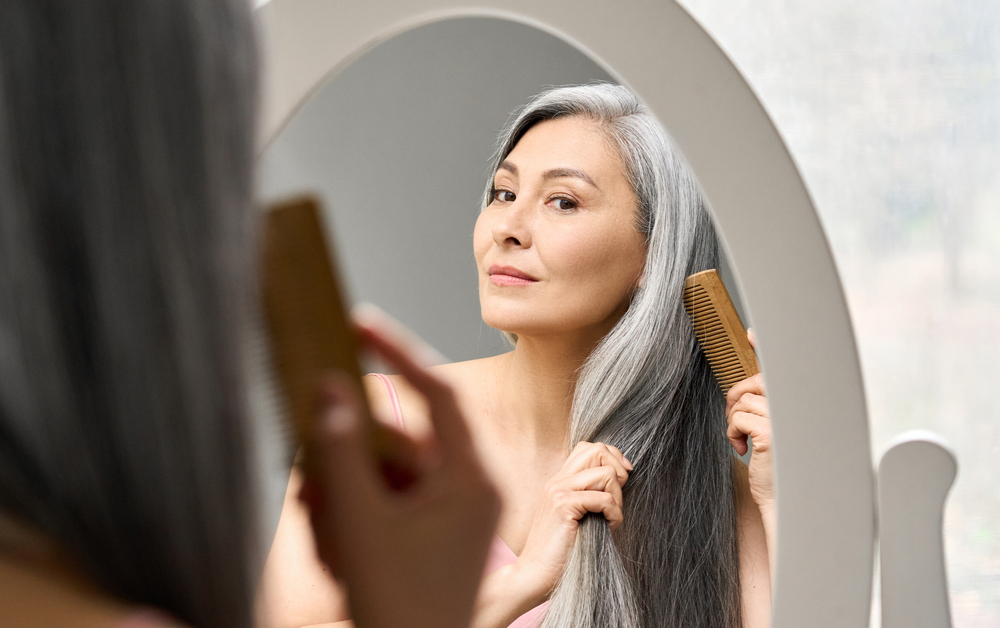Humans have experienced hair loss for thousands of years and tried to find ways to stop it. In ancient Egypt, unusual treatments included applying boiled porcupine hair to the scalp and consuming the leg of a female greyhound. Hippocrates even touted castration as a baldness prevention.
Currently, supplements are a common source people turn to in the hopes of preventing hair loss or restoring hair. Unfortunately, there is no magic pill, but certain supplements can potentially aid in hair growth or mediate hair loss.
What Causes Hair Loss?
The medical term for hair loss is alopecia, and it is caused by an autoimmune reaction attacking hair follicles. This is generally caused by the combination of genetic factors, such as family history and genetic markers, and environmental factors, including stress, infections, and dietary influences.
Read More: Why Do Humans Go Bald?
How to Stop Hair Loss
From topical treatments and oral medications to advanced surgical procedures, the landscape of hair loss treatments is broad. But there are some common treatments available today.
Minoxidil: Initially developed as an oral medication for severe hypertension in the 1970s, Minoxidil’s unintended side effect of hair regrowth led to its topical application for treating alopecia in both men and women.
Finasteride: An FDA-approved medication originally designed for benign prostatic hyperplasia, Finasteride inhibits the conversion of testosterone to dihydrotestosterone (DHT), which slows hair loss.
Scalp reduction: A procedure in which the part of your scalp without hair is removed and the section with hair is stretched to cover it.
Grafting: This is a type of hair transplant in which small pieces of tissue that contain hair follicles are removed from one area of the scalp and implanted into another area.
Light/laser therapy: Red light therapy is believed to stimulate hair growth. This process involves several sessions in order to see results. Research shows it may be an effective treatment against baldness when combined with minoxidil or finasteride.
Read More: Strange Side Effects From Supplements and What You Need to Know
What are the Best Supplements for Hair Loss?
These supplements are worth a try when dealing with hair loss, although they’re most effective when correcting a deficiency.
Biotin
Vitamin B7 — better known as biotin — plays a role in the production of keratin, as well as creating oxygen-carrying red blood cells. While the research doesn’t yet prove that biotin can grow new hair, clinical improvement has been observed in patients with biotin deficiencies or specific hair and nail disorders after taking biotin supplements. It might also make the hair you have thicker and stronger. Biotin is also found in the following foods: eggs, meat, nuts, salmon, tofu, sweet potatoes, and lentils.
Iron
Getting an adequate amount of iron is necessary for hair growth. Iron helps produce hemoglobin, which in turn provides oxygen for hair follicles to grow. Low hemoglobin levels result in stunted hair growth. But research is conflicted on whether an iron supplement can positively impact hair. Iron is also found in the following foods: Red meat, poultry, fish, dark leafy greens, peas, figs, and cabbage.
Vitamin D
Without enough vitamin D, hair follicles can’t function or grow normally. When vitamin D levels are deficient, the body can’t normally spur the growth phase of the hair cycle. Inhibiting the growth cycle can result in hair loss. If you have an identified vitamin D deficiency, supplementing can help correct the condition, along with other symptoms associated with insufficient vitamin D levels. Vitamin D is also found in the following foods: including egg yolks, fatty fish, mushrooms, liver, and milk.
Zinc
Zinc promotes hair growth by keeping the scalp’s oil glands functioning, which helps hair follicles to grow. It also protects against follicle loss and aids in follicle recovery. Zinc deficiencies can cause hair loss. People who drink alcohol excessively, those with Crohn’s disease, pregnant or breastfeeding women, and people who have chronic kidney ailments are more susceptible. You can also get zinc from food, including oysters, beef, pork, legumes, and nuts.
Read More: It’s Tricky to Know Which Supplements Are Safe
This article is not offering medical advice and should be used for informational purposes only.
Article Sources:
Our writers at Discovermagazine.com use peer-reviewed studies and high-quality sources for our articles, and our editors review them for accuracy and trustworthiness. Review the sources used below for this article:


